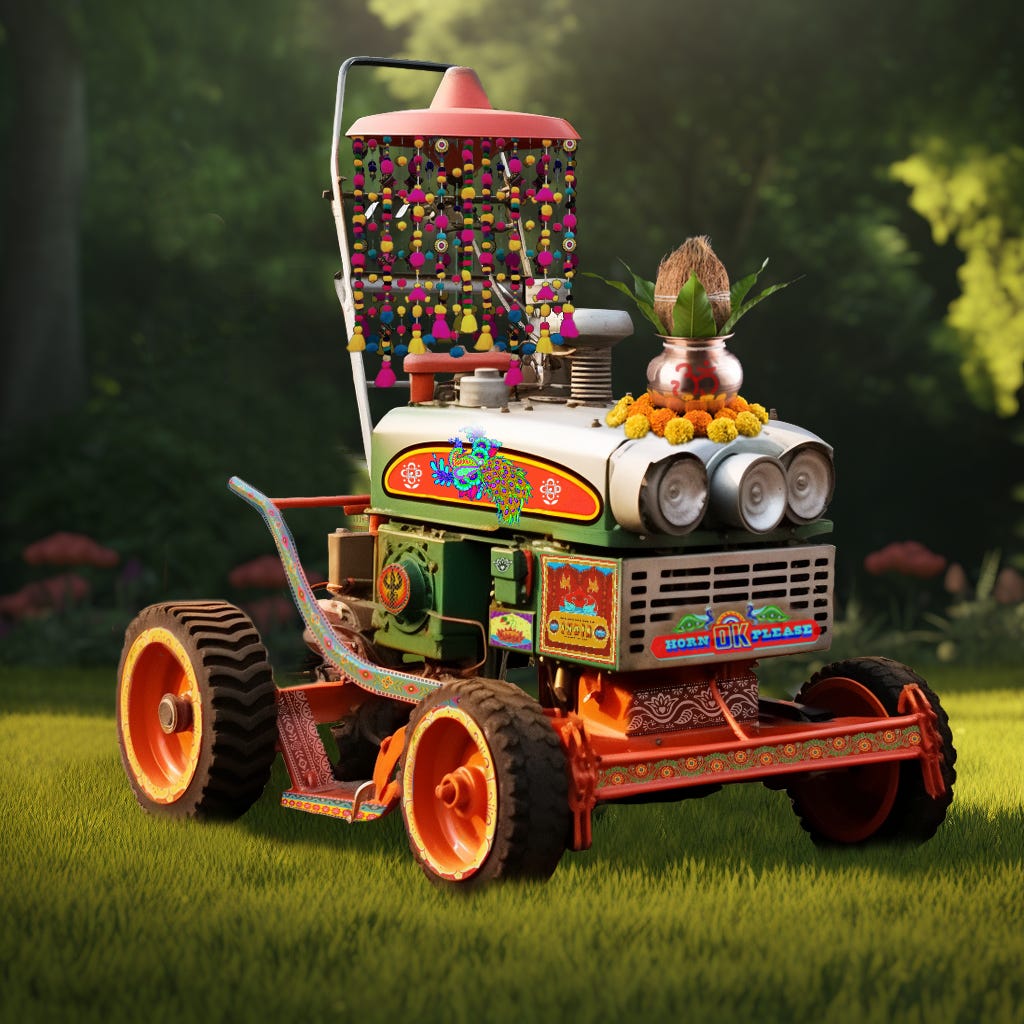The Polestar and a Determined Boy
Insulted and feeling ignored, a five-year-old boy enters the forest to perform severe penance and attract Lord Nārāyaṇa's blessings to get the most exalted position in the universe.
King Uttānapāda had two wives: Sunīti and Suruci. The king gave far more attention to Suruci and was not much interested in Sunīti.
One day, Uttānapāda was playing with Uttama, his son from Suruci, when he affectionately picked him up and placed him on his lap. Dhruva, his son from Sunīti, also desired to sit on his father’s lap and was trying to pull himself up to be included. The king, sadly, was not very welcoming of his other son.
Queen Suruci was observing this and, out of envy, decided to speak harshly to the five-year-old Dhruva, “My dear child, you do not deserve to sit on the throne or on the lap of the King. Surely you are also the son of the King, but because you did not take your birth from my womb, you are not qualified to sit on your father’s lap. Therefore, you should know that your attempt is doomed to failure.”
The boy Dhruva stood there in shock as the words pierced his heart.
Suruci continued, “You are trying to fulfil a desire which is impossible to fulfil. If you at all desire to rise to the throne of the King, then you have to undergo severe austerities. Firstly, you must satisfy the Supreme Lord, Nārāyaṇa, and then, when you are favoured by Him, you shall have to take your next birth from my womb.”
Young Dhruva’s feelings were so deeply insulted that, first, his hands then the rest of his body trembled with anger. Not being able to bear any more, he ran away to find his mother, Sunīti. Upon hearing the injurious language used against her son, Sunīti also became aggrieved but, rather than take a reactive stance, she advised Dhruva not to wish any ill towards them. She recommended that he actually take Suruci’s advice and attempt to satisfy Nārāyaṇa (or Lord Viṣṇu).
So, at five years of age, Dhruva left for the forest with the intention to perform severe aesthetic austerities in mystic meditation.
Soon after, the great sage Nārada Muni came to hear of the boy Dhruva’s determination and decided to pay him a visit to try to convince him to return home. It is in this section of Śrīmad-Bhāgavatam, we’re given this edifying verse (4.8.34) to help us become sane in our social interactions.
गुणाधिकान्मुदं लिप्सेदनुक्रोशं गुणाधमात् ।
मैत्रीं समानादन्विच्छेन्न तापैरभिभूयते ॥ ३४ ॥guṇādhikān mudaṁ lipsed anukrośaṁ guṇādhamāt
maitrīṁ samānād anvicchen na tāpair abhibhūyate“Every man should act like this: when he meets a person more qualified than himself, he should be very pleased; when he meets someone less qualified than himself, he should be compassionate toward him; and when he meets someone equal to himself, he should make friendship with him. In this way, one is never affected by the threefold miseries of this material world.”
Dhruva was respectful by nature, so listened to Śrī Nārada with reverence. In response, he then honestly expressed that it was not in his nature to follow his recommendation to return home. He would rather be advised on how to achieve a position more exalted than any ever occupied by anyone else in the universe.
Nārada felt compassion on the boy’s emotionally wounded situation. Knowing that devotional activity can bestow the priceless goal of pure love for God as well as fulfil any material desire, he gave Dhruva some elevating council. He advised the boy to go to the sacred forest of Madhuvana near the river Yamunā, bathe in Her sacred waters three times daily, perform aṣṭāṅga-yoga, and meditate on the beautiful form of Lord Viṣṇu. Nārada gave Dhruva the twelve-syllable mantra:
ॐ नमो भगवते वासुदेवाय
oṁ namo bhagavate vāsudevāya
He then advised Dhruva to shape a form of the Lord out of mud and to offer flowers, tree bark, and if possible, Tulasī leaves, which are very dear to the Lord.
Upon hearing this advice, Dhruva offered Nārada his respectful obeisances. Then, inspired, he started for Madhuvana, which is always imprinted with the lotus footprints of Lord Kṛṣṇa and is therefore especially auspicious.
For the first month, Dhruva Mahārāja ate only fruits and berries on every third day, just to keep his body and soul together.
In the second month, Dhruva Mahārāja ate only dry grass and leaves every six days.
In the third month, he drank water only every nine days. Thus, he remained completely in trance and worshipped Nārāyaṇa.
In the fourth month, Dhruva became a complete master of his breathing, and thus he inhaled air only every twelfth day.
By the fifth month, Dhruva had controlled his breathing so perfectly that he was able to stand on only one leg, just as a column stands, without motion, and concentrate his mind fully on the form of God within himself. This breathing exercise resulted in the demigod residents of the higher planets becoming disturbed, as they felt suffocated by the resultant closure of the viśvam ātmanaḥ, or total body of the universe. They protested to Lord Viṣṇu, who assured them that it was due to the severe austerity and full determination of the boy Dhruva, and that he would stop him from these acts. Viṣṇu then got on the back of his celestial eagle Garuḍa, who carried Him to the Madhuvana Forest to see the child.
There, Viṣṇu found Dhruva, eyes closed in ecstasy, meditating on the brilliant-as-lightning form of Himself within the child’s heart. He saw that Dhruva was tranquil and oblivious to the suffocation he was inflicting on all living entities in the universe. When Viṣṇu stood before him, His form vanished from Dhruva’s mind and broke his meditation. Much to his surprise, as soon as he opened his eyes, he saw Lord Nārāyaṇa personally present, just as he had been seeing Him in his heart.
Dhruva was overwhelmed in ecstasy and, while trembling with ecstatic emotion, fell to the ground to offer his obeisances. Stunned, Dhruva looked up to drink in the form of the Lord with his eyes. He then began kissing Viṣṇu’s lotus feet, and embracing Him with his arms. After his mind acclimatised to the lovingly pure atmosphere of being in the presence of God, Dhruva wanted to offer words of glorification. Being a small boy of just five years, he lacked an extensive vocabulary so, speechless, he stood before his beloved Viṣṇu with folded hands. Understanding the child’s desire, the all-merciful Viṣṇu reached out with his conchshell, named Pāñcajanya, and touched Dhruva on his forehead.
A mystical and powerful transformation then took place in Dhruva’s consciousness. He instantly became perfectly aware of the conclusions of all the sacred Vedic texts. He suddenly understood the Absolute Truth and Viṣṇu’s relationship with all living entities.
With deep gratitude, Dhruva first spoke articulate words of appreciation for how Nārāyaṇa had awoken him from within. He then spoke philosophically about how the Lord is the master of material nature yet a well-wisher to all. Dhruva then expressed how his previous desire to rule a kingdom was futile and shallow. He thus revised his request:
“O unlimited Lord, kindly bless me so that I may associate with great devotees who engage in Your transcendental loving service constantly, as the waves of a river constantly flow. Such transcendental devotees are completely situated in an uncontaminated state of life. By the process of devotional service I shall surely be able to cross the nescient ocean of material existence, which is filled with the waves of blazing, firelike dangers. It will be very easy for me, for I am becoming mad to hear about Your transcendental qualities and pastimes, which are eternally existent. O Lord, who has a lotus navel, if a person happens to associate with a devotee whose heart always hankers after Your lotus feet, seeking always their fragrance, he is never attached to the material body or the mundane relationships associated with it.”
Dhruva continued:
“Now I can see that a loving relationship with you is far better than becoming king and lording it over a kingdom. That is the benediction of worshipping Your lotus feet.”
It is interesting to note Dhruva’s emotional transformations in the story thus far. At first, he affectionately wanted to play on his father’s lap. After being insulted, he then felt very hurt, which quickly transformed into anger. He ran to his mother, who lamented the situation and advised him to take shelter of the Lord.
His anger then morphed into determination to the extent that even calming words from the exalted Nārada could not dissuade him. Taking Nārada’s revised advice, he then focused his energy on meditating on the form of God. This elevated his emotions beyond the mundane and into the realm of transcendence.
Then Dhruva’s meditation broke, he opened his eyes and was overwhelmed with emotion to the point of falling to the ground and covering the feet of Nārāyaṇa in tearful kisses.
He then felt shame for having desired something so difficult to obtain in this world.
This psychology then shifted into a hankering emotion in pursuit of the association of those who similarly wanted nothing of this temporary world and everything of the permanent world of loving relationship with God.
He then expressed his gratitude for being protected and sheltered by the Lord.
After hearing Dhruva’s words, Lord Viṣṇu responded:
“My dear Dhruva, I shall award you the glowing planet known as the polestar, which will continue to exist even after the dissolution at the end of the millennium. No one has ever ruled this planet, which is surrounded by all the solar systems, planets and stars. Keeping the polestar to their right, all the stars inhabited by the great sages like Dharma, Agni, Kaśyapa and Śukra circumambulate this planet.”
So Dhruva received his desire and much more. This Polestar is known in western astronomy as Polaris, or the North Star. It sits more or less directly above the Earth's North Pole along our planet's rotational axis (the imaginary line that extends through the planet and out of the north and south poles). Our Earth rotates around this axis, like a spinning top.
This star is an important point in the celestial sky for both ocean and land navigation throughout recorded history. It can easily be found with the naked eye as the bright star at the end of the handle of Ursa Minor, or the “Little Dipper”.
According to material estimates, it is said to be two-thousand five-hundred times brighter than our own sun and have about four and a half times the mass. According to Bhāgavatam cosmology, this star planet is not destroyed at the cyclical dissolution of the universe and is essentially an embassy of Vaikuṇṭha within this dimension.
There lives Dhruva Mahārāja to this day. The personalities from Bhāgavatam are not as far away as we may think.
Suburban Mysticism is free, but if you feel inspired and want to return some love, consider helping Ekendra to care for cows, or share the article with others.
These words were not generated with or augmented by artificial intelligence; just “flawsome” human thoughts here … with, of course, due homage to The Algorithm that abides over us all.







Thankyou.
Superexcellent.
Hare KRSNA